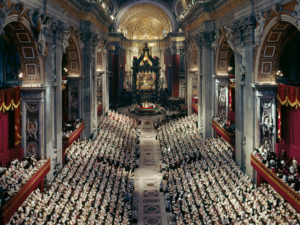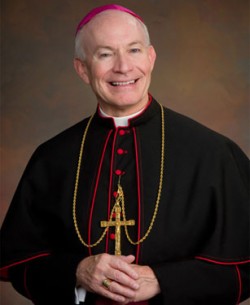Podcast: Play in new window | Download (Duration: 29:35 — 20.5MB) | Embed
Subscribe: Apple Podcasts | Spotify | Amazon Music | Android | Pandora | iHeartRadio | JioSaavn | Podchaser | Gaana | Podcast Index | Email | TuneIn | Deezer | Anghami | RSS | More

Episode 24 Vatican II – Gaudium et Spes pt. 1 – Why it Matters: An Exploration of Faith with Archbishop George Lucas
In this episode with Archbishop Lucas, we begin a conversation on the Pastoral Constitution on the Church in the Modern World
Gaudium et spes (Ecclesiastical Latin: [ˈɡau̯di.um et ˈspes], “Joy and Hope”), the Pastoral Constitution on the Church in the Modern World, is one of the four constitutions resulting from the Second Vatican Council in 1965. It was the last and longest published document from the council and is the first constitution published by an ecumenical council to address the entire world.
Approved by a vote of 2,307 to 75 of the bishops assembled at the council, it was promulgated by Pope Paul VI on 7 December 1965, the day the council ended.
An excerpt from Gaudium et Spes:
1. The joys and the hopes, the griefs and the anxieties of the men of this age, especially those who are poor or in any way afflicted, these are the joys and hopes, the griefs and anxieties of the followers of Christ. Indeed, nothing genuinely human fails to raise an echo in their hearts. For theirs is a community composed of men. United in Christ, they are led by the Holy Spirit in their journey to the Kingdom of their Father and they have welcomed the news of salvation which is meant for every man. That is why this community realizes that it is truly linked with mankind and its history by the deepest of bonds.
2. Hence this Second Vatican Council, having probed more profoundly into the mystery of the Church, now addresses itself without hesitation, not only to the sons of the Church and to all who invoke the name of Christ, but to the whole of humanity. For the council yearns to explain to everyone how it conceives of the presence and activity of the Church in the world of today.
Therefore, the council focuses its attention on the world of men, the whole human family along with the sum of those realities in the midst of which it lives; that world which is the theater of man’s history, and the heir of his energies, his tragedies and his triumphs; that world which the Christian sees as created and sustained by its Maker’s love, fallen indeed into the bondage of sin, yet emancipated now by Christ, Who was crucified and rose again to break the strangle hold of personified evil, so that the world might be fashioned anew according to God’s design and reach its fulfillment.
3. Though mankind is stricken with wonder at its own discoveries and its power, it often raises anxious questions about the current trend of the world, about the place and role of man in the universe, about the meaning of its individual and collective strivings, and about the ultimate destiny of reality and of humanity. Hence, giving witness and voice to the faith of the whole people of God gathered together by Christ, this council can provide no more eloquent proof of its solidarity with, as well as its respect and love for the entire human family with which it is bound up, than by engaging with it in conversation about these various problems. The council brings to mankind light kindled from the Gospel, and puts at its disposal those saving resources which the Church herself, under the guidance of the Holy Spirit, receives from her Founder. For the human person deserves to be preserved; human society deserves to be renewed. Hence the focal point of our total presentation will be man himself, whole and entire, body and soul, heart and conscience, mind and will.

For the documents of Vatican II visit here
For more episodes in this series visit the


